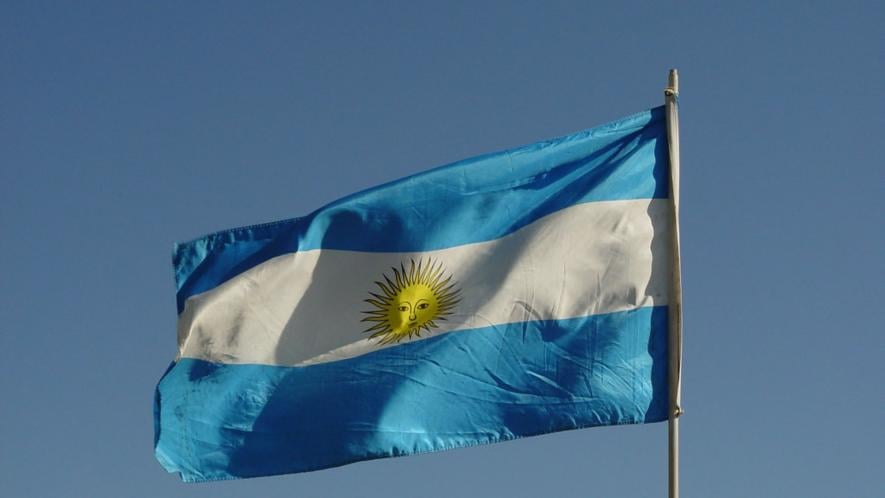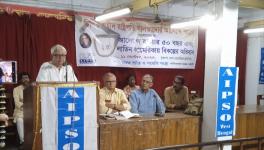Elections in Argentina: A Working Class Perspective

Image Courtesy: Flickr
A few days before the October 22 elections in Argentina, almost 90% of the polls indicated that the winner would be Javier Milei, the “insane” candidate of the Right—as described by Estela de Carlotto, president of the legendary human rights group Abuelas de Plaza Mayo (Grandmothers of Plaza Mayo). As it turned out, Sergio Massa (of the coalition Unión por la Patria - UP) prevailed over Milei by almost seven points. Massa and Milei will face off on November 19 in the run-off for the presidency of the country with South America’s second-largest economy.
On August 13, Milei prevailed over all the other candidates in Argentina’s primary. In the months between that election and the one in October, Massa—who is the Minister of the Economy in the current government—added three million votes to his tally.
Georgina Orellano, National General Secretary of AMMAR (Asociación de Mujeres Meretrices de Argentina) told me how this phenomenon was experienced in Constitución, the area of Buenos Aires where the main headquarters of her organisation is located.
Sex workers organised themselves to monitor both electoral processes in the schools where it was their turn to vote. “In the PASO [primary elections],” she told me, “the worrying result was that the UP force came in third and Milei in first place.” However, this time, “we won in almost all the schools in the Constitución neighborhood.” In fact, “in all the polling stations where sex workers supervised the elections, Massa won.”
The Practical and the Theoretical
Elsa Yanaje, marketing director of the Instituto Nacional de Agricultura Familiar, Campesina e Indígena (National Institute of Family, Peasant, and Indigenous Agriculture) and member of the Federación Rural para la Producción y el Arraigo (Rural Federation for Production and Rooting) believes that the result of the PASO (primary election) was linked to two things: on the one hand, Milei’s communications success in being the only candidate who reflected underlying anger or weariness with the country’s economic situation. “It was about saying what is not said,” Yanaje said. That is, “what a citizen angry with the management [of the central government] could think.”
Yanaje said that in the PASO a vote to warn (more than to punish) was given to the current government. A vote that asked: “What kind of methodology are you going to use to reverse the situation or somehow guarantee some basic services?” Argentina is currently facing a strong economic contraction and high inflation rates, which have especially affected “those who were already below the poverty line,” says Yanaje.
In this context, Milei’s proposals “were somehow charming,” but in practice, Yanaje adds, “we knew that [they were] difficult to maintain.” Between the two choices, the leader explains, “What was reversed [with the new election results was]… a decision between the practical and the theoretical.”
The theoretical “was what Milei promised with his proposal of dollarisation, privatisation, etc.” When these promises were analysed by communities, it was evident that they were impossible to execute. This exercise of analysis, reflection, and debate was what led people to take their votes towards the practical: the candidate who was linked to the popular sectors was Massa, with more egalitarian proposals that appealed to more sectors of the population.
On the other hand, Orellano considers the results of October 22 to also reflect a popular rejection of Milei’s proposal to “take away rights.” “Many of us were born with a basic right to public health, to public education and we cannot conceive of living without them,” Orellano said.
During the last weeks of campaigning, Milei railed against these fundamental rights, including state subsidies to public transportation. “We learned that if the subsidy is removed,” Orellano told me, “we workers could go from paying 70 pesos to more than 1,000.” This type of data generated an awareness that was reflected in recent electoral results.
The Ballot
The second round of elections in Argentina will be held on November 19. Milei, in his first statements after the last elections, declared that his objective is “to put an end to Kirchnerism.” For Orellano, this call seeks to summon the votes of Juntos por el Cambio (Together for Change), the extreme Right-wing coalition whose candidate, Patricia Bullrich, took third place in the elections. Milei’s campaign, Orellano explains, was built against Kirchnerism and “against [the] working class and trade unionists.”
Both Orellano and Yanaje are proud of the political work carried out during these elections. In the family, peasant, and indigenous agriculture sector, of which Yanaje is a member, there is no political campaigning, out of respect for the diversity of thought of the people it brings together. However, constant debate, collective analysis, and organisation bear fruit. “There was a reflection on what was coming,” she tells me. “We are defining the course of the country, so we had to stand firm. There was a lot of militancy.”
For AMMAR’s women, they campaigned in their neighbourhoods, talking to everyone. “For the second round, we are going to be active in all the provinces where we are organised,” says Orellano. They plan to increase the number of election observers in the schools of the municipalities where AMMAR has a presence.
Sex workers are aware of what is at stake with these two antagonistic proposals for the country. “We know what this denialist, fascist, violent, xenophobic, racist discourse represents being against diversity, against women, against feminism, and against the victories of the working class,” Orellano tells me. “So, we sex workers are going to do everything in our power to make sure that the next president of Argentina is Sergio Massa.”
Taroa Zúñiga Silva is a writing fellow and the Spanish media coordinator for Globetrotter. She is the co-editor with Giordana García Sojo of Venezuela, Vórtice de la Guerra del Siglo XXI (2020). She is a member of the coordinating committee of Argos: International Observatory on Migration and Human Rights and is a member of the Mecha Cooperativa, a project of the Ejército Comunicacional de Liberación.
Source: This article was produced by Globetrotter.
Get the latest reports & analysis with people's perspective on Protests, movements & deep analytical videos, discussions of the current affairs in your Telegram app. Subscribe to NewsClick's Telegram channel & get Real-Time updates on stories, as they get published on our website.
























